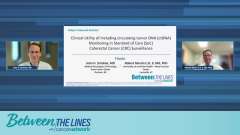
Communicating the Risk of Disease Relapse to the Patient After Curative CRC Resection
Experts discuss how initial postoperative visits after colorectal cancer surgery integrate pathology review, recurrence risk assessment, and timely ctDNA testing to personalize prognosis and guide surveillance, emphasizing the importance of surgical quality indicators and molecular tools in shaping follow-up care.
Episodes in this series

When clinicians meet with patients for their first postoperative visit after colorectal cancer surgery, the conversation focuses on surgical outcomes and cancer prognosis. This discussion typically begins with reviewing the pathology report, particularly emphasizing surgical quality indicators such as clear radial, proximal, and distal margins. The number of lymph nodes harvested is also key, with an ideal target in the 20s to confirm the thoroughness of the oncologic procedure. The number of positive nodes and the tumor’s morphological features help guide the conversation around recurrence risk.
Explaining recurrence risk involves more than just traditional staging. For example, higher-risk patients with stage III disease with greater lymph node involvement are differentiated from those with lower-risk stage II disease. However, despite these distinctions, patients with either stage II or III disease are typically monitored using circulating tumor DNA (ctDNA) as a prognostic tool. This blood-based biomarker helps detect minimal residual disease and offers a personalized view of recurrence potential, enhancing the ability to tailor postoperative management.
Timing of the ctDNA test is critical to avoid false positives. To ensure accuracy, the test is scheduled 4 to 6 weeks after surgery, rather than immediately postoperatively, when residual DNA from surgical manipulation could interfere with results. By integrating standard pathology, staging, and ctDNA testing, clinicians can offer patients a clearer understanding of their prognosis and guide the next steps in surveillance and treatment planning more effectively.
Newsletter
Stay up to date on recent advances in the multidisciplinary approach to cancer.


































